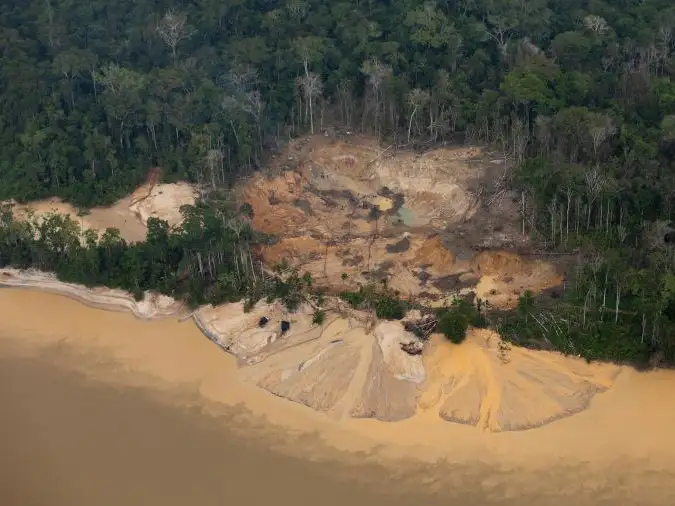Gold sold on our high streets could be linked to the destruction of indigenous communities’ lives and the environment in the Brazilian Amazon.
What is the business activity’s impact on communities?
Illegal and illicit gold mining in Yanomami Indigenous Territory (TIY) has severe impacts on the health, livelihoods and environment of indigenous communities, such as the Yanomami and Ye’kwana peoples. Despite having their land officially recognised in 1992, the largest indigenous land in Brazil has been under constant threat from illegal gold miners for decades.
Abuse includes the mass destruction of forests using heavy machinery, assault and injury from illegal mining invasions and conflict in indigenous lands, including increased cases of malaria and other infectious diseases, and mercury poisoning of water and food sources.
The Yanomami and Ye’kwana peoples depend on and help to protect a forest area the size of Portugal for future generations: they are the stewards of our common home. But mining is causing deforestation in the Amazon to reach a critically high level: some parts of the south-eastern Brazilian Amazon now emit more CO2 than they absorb.


Caption: Illegal gold mining in the Uraricoera river in Yanomami Territory, January 2022. Photo: Bruno Kelly/ISA
The gold miners killed my uncle in 2009. They killed him because he didn't want gold mining in indigenous lands. They took him to a waterfall, they wrapped him in fabric and used stones to weigh him down.
* Due to increased security threats in the region, CAFOD has not included photos or names of indigenous leaders to protect their identities
How are UK companies implicated?
London is a global centre for gold trading and gold is also used in many products that we use in the UK, such as electronics and jewellery. The UK is one of the biggest importers of Brazilian gold and it is impossible to prove that Brazilian gold imported by UK companies is not connected to abuse of indigenous peoples and the environment.
The local population should have a special place at the table; they are concerned about their own future and that of their children, and can consider goals transcending immediate economic interest.
What could make a difference for communities, and how is CAFOD working towards this?
CAFOD is urging the UK government to support President Luiz Inácio Lula da Silva’s efforts to remove the approximately 20,000 illegal gold miners that have been operating in Yanomami Indigenous Territory, and support indigenous human rights defenders by providing financial support (e.g. via the Amazon Fund).
We want the UK Government to take action to prevent UK businesses from contributing to and benefitting from the trade in Brazilian ‘blood’ gold, including new legislation to tackle abuse in supply chains and traceability requirements for gold imports.
We are also calling on British banks and investors to withdraw their investments in Brazilian gold until sufficient action has been taken to tackle illegal mining in Brazil, and we want voluntary bodies like the London Bullion Market Association to make public reporting on the countries of origin and the names of gold suppliers in high-risk areas mandatory.

